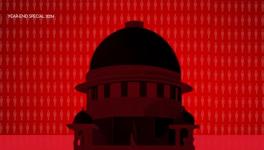Justice Sanjiv Khanna’s Journey: From Tis Hazari to 51st CJI

On Thursday, the President of India appointed Justice Sanjiv Khanna as the Chief Justice of India (CJI), effective November 11. The incumbent CJI, Dr D.Y. Chandrachud, is slated to demit office on November 10 after two years in office.
Justice Khanna will have a tenure of six months, till May 13, 2025. He hails from the Delhi High Court where he was appointed as judge in 2005. As per the information available on the Supreme Court website, Justice Khanna practised in the district court at the Tis Hazari Complex, Delhi, and later, in the High Court of Delhi and tribunals in fields as diverse as constitutional law, direct taxation, arbitration, commercial law, company law, land law, environmental law and medical negligence.
He had a long tenure as a senior standing counsel for the income tax department. In 2004, he was appointed as the standing counsel (civil) for the National Capital Territory of Delhi.
Justice Khanna is the nephew of Justice H.R. Khanna, who was denied the office of the CJI by the Indira Gandhi government for his dissent in the infamous ADM Jabalpur case.
He also appeared and argued in a number of criminal cases at the Delhi High Court as an additional public prosecutor and an amicus curiae.
Justice Khanna is the nephew of Justice Hans Raj Khanna, who was denied the office of the CJI by the Indira Gandhi government for his dissent in the infamous ADM Jabalpur case. Justice H.R. Khanna was the sole dissenting judge on a five-judge Bench which declared by 4:1 that the government could suspend fundamental rights and detain citizens without due process during a national emergency.
A controversial leapfrog
Justice Sanjiv Khanna was appointed to the Supreme Court on January 18, 2019. His appointment to the Supreme Court was not free from controversy.
The collegium, which comprised the then CJI Ranjan Gogoi and Justices A.K. Sikri, S.A. Bobde, N.V. Ramana and Arun Mishra, had made a recommendation to appoint Justice Khanna as judge of the Supreme Court.
At that time, Justice Khanna was at serial number 33 in the combined seniority of high court judges on an all-India basis. Thus, his appointment to the Supreme Court superseded many senior judges.
He also superseded three judges in his parent high court, namely Justices Pradeep Nandrajog, Gita Mittal and Justice S. Ravindra Bhat. Justice Bhat went on to become a Supreme Court judge on September 23, 2019.
The then-sitting judge of the Supreme Court Justice Sanjay Kishan Kaul had written to Justice Gogoi objecting to the supersession of Justice Pradeep Nandrajog, who was senior to Justice Khanna.
In fact, the collegium, on December 12, 2018, had recommended the appointment of Justice Rajendra Menon and Justice Pradeep Nandarajog to the Supreme Court. At that time, Justice Madan B. Lokur was part of the collegium. But for some reason, the copy of the resolution was not uploaded on the court’s website.
After the retirement of Justice Lokur in December, the collegium, which now had Justice Arun Mishra as well, came out with a resolution in public to elevate Justice Dinesh Maheshwari and Sanjiv Khanna. The reasons for dropping the names of Justice Menon and Nandrajog were not mentioned in the resolution.
The January 10, 2019 resolution merely mentioned that the collegium had decided to take a ‘fresh look’ at the December 12 decision after the winter break.
Justice Gogoi, in his autobiography, states that he proposed the appointment of Justice Khanna since if he were elevated at that point in time, he would go on to become CJI for six months.
He further writes that the Delhi High Court would have a CJI in 2024 when Justice Khanna is due to become CJI after a gap of almost 20 years. The last CJI from Delhi High Court was Justice Yogesh Kumar Sabharwal who demitted office in 2006.
Later, speaking at an event organised by The Leaflet, Justice Lokur confirmed that a resolution to recommend the names of Justice Menon and Justice Nandrajog was indeed signed and that he was disappointed that the collegium decision of December 12 had not been uploaded.
Decisions, decisions
Justice Khanna has been part of various crucial decisions.
Justice Sanjiv Khanna was appointed to the Supreme Court on January 18, 2019. His appointment to the Supreme Court was not free from controversy.
Justice Khanna was part of a three-judge Bench headed by the then CJI Gogoi which sat on a Saturday (April 20, 2019) taking suo motu cognisance of the sexual harassment allegations against Gogoi.
The Bench also had Justice Arun Mishra on it. The Bench verbally denied the allegations and questioned the motives of the complainant, a former staff of the Supreme Court.
When the Order passed on April 20, 2019 was uploaded on the court’s website, the name of CJI Gogoi was missing in the Bench composition. The Order was signed by Justice Mishra and Justice Khanna only.
The Order advised the media to show restraint, act responsibly as is expected from them, and accordingly decide what should or should not be published as wild and scandalous allegations undermine and irreparably damage the reputation and negate the independence of the judiciary.
In his dissent in the Central Vista project matter, Justice Khanna held that public participation cannot be a mechanical exercise or formality in a decision-making process. The majority opinion by Justice A.M. Khanwilkar and Justice Dinesh Maheshwari found no infirmities in the decision-making process about the Central Vista project.
Justice Khanna was part of a five-judge Bench that upheld the dilution of Article 370 of the Constitution which conferred special status to Jammu and Kashmir. He was also part of a Bench that struck down the Union government’s 2018 scheme of introducing electoral bonds.
Justice Khanna also penned the judgment for the court in 2019 holding that the office of the CJI comes under the Right to Information Act, 2005.
Justice Khanna also penned a unanimous judgment for a five-judge Bench that held that the Supreme Court can, in the exercise of its inherent power under Article 142 of the Constitution, dissolve a marriage that has irretrievably broken down.
Justice Khanna also headed a Bench that dismissed petitions challenging the appointment of advocate and Bharatiya Janata Party (BJP) member Lekshmana Chandra Victoria Gowri as an additional judge of the Madras High Court on the grounds of her ‘hate speeches’ against minority communities in the past.
The Bench observed that it was presumptive to think that the collegium did not have material information about Gowri while recommending her name.
Justice Khanna also authored a judgment denying bail to Aam Aadmi Party leader Manish Sisodia in the Delhi excise policy case. Earlier this year, a Bench led by Justice Khanna granted interim bail to the then Delhi Chief Minister Arvind Kejriwal in a case registered against him under the Prevention of Money Laundering Act (PMLA), 2002 in connection with the alleged liquor scam case.
Justice Khanna headed a Bench that dismissed petitions challenging the appointment of advocate and BJP member L.C. Victoria Gowri as an additional judge of the Madras High Court.
But by directing him to not visit the chief ministerial office or the Delhi secretariat while being out on bail, the court effectively put Kejriwal’s chief ministership in limbo. Eventually, Kejriwal chose to resign later.
Justice Khanna also presided over a Bench that dismissed petitions demanding 100 percent cross-verification of votes cast on Electronic Voting Machines (EVM) with Voter Verified Paper Audit Trails (VVPATs) or revert to the ballot paper system.
Justice Khanna’s outgoing predecessor is leaving behind a docket of many crucial cases which includes the validity of marital rape exception, the validity of restitution of conjugal rights under the Hindu Marriage Act, 1955 and the Special Marriage Act, 1954 and the contours of a money Bill.
Justice Khanna will also be taking a call on the formation of a new Bench to decide on a petition seeking a review of the court’s ruling denying marriage equality to the LGBTQI+ community. Earlier, Justice Khanna chose to recuse from the review petitions. However, as master of the roster, he will now have to form the new Bench for the same.
Get the latest reports & analysis with people's perspective on Protests, movements & deep analytical videos, discussions of the current affairs in your Telegram app. Subscribe to NewsClick's Telegram channel & get Real-Time updates on stories, as they get published on our website.
























